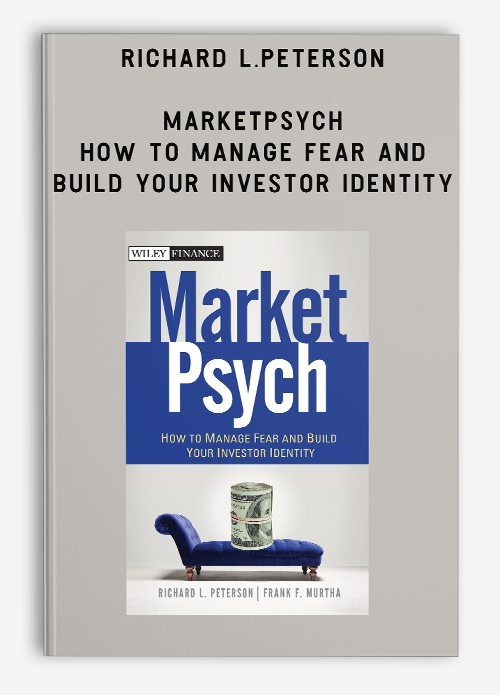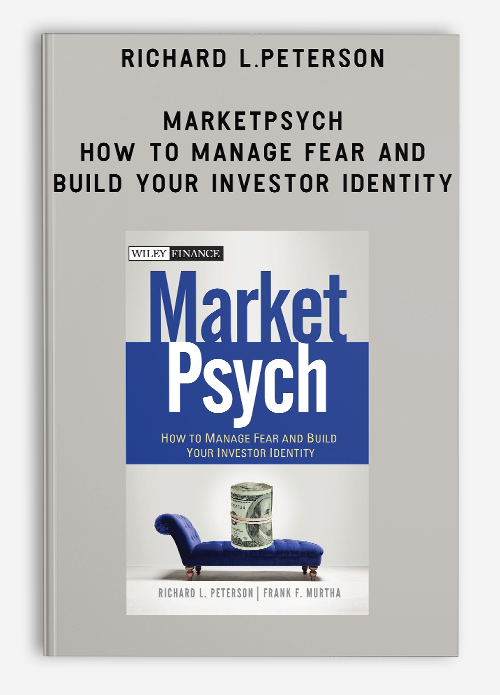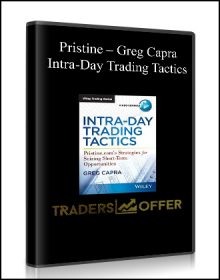Richard L.Peterson – MarketPsych. How to Manage Fear and Build Your Investor Identity
$25.00
Product Include:
File size:
Richard L.Peterson – MarketPsych. How to Manage Fear and Build Your Investor Identity
**More information:
Get Richard L.Peterson – MarketPsych. How to Manage Fear and Build Your Investor Identity at Salaedu.com
Description
An investor’s guide to understanding the most elusive (yet most important) aspect of successful investing – yourself.
Why is it that the investing performance of so many smart people reliably and predictably falls short? The answer is not that they know too little about the markets. In fact, they know too little about themselves.
Combining the latest findings from the academic fields of behavioral finance and experimental psychology with the down-and-dirty real-world wisdom of successful investors, Drs. Richard Peterson and Frank Murtha guide both new and experienced investors through the psychological learning process necessary to achieve their financial goals.
In an easy and entertaining style that masks the book’s scientific rigor, the authors make complex scientific insights readily understandable and actionable, shattering a number of investing myths along the way. You will gain understanding of your true investing motivations, learn to avoid the unseen forces that subvert your performance, and build your investor identity – the foundation for long-lasting investing success.
Replete with humorous games, insightful self-assessments, entertaining exercises, and concrete planning tools, this book goes beyond mere education. MarketPsych: How to Manage Fear and Build Your Investor Identity functions as a psychological outfitter for your unique investing journey, providing the tools, training and equipment to help you navigate the right paths, stay on them, and see your journey through to success.
TABLE OF CONTENTS
Preface ix
Acknowledgments xiii
Chapter 1 Your Investor Identity: And Why You Need One 1
Chapter 2 Investor Identity Fundamentals: Frames, Motivations, and Goals 15
Chapter 3 Your Investor Personality: Your Character and Style 49
Chapter 4 Your Investor Emotions: The Hidden Drivers of Behavior 69
Chapter 5 Your Investor Values: What’s Most Important to You? 99
Chapter 6 Your Investor Blind Spots: Identifying (and Avoiding) Mental Traps 115
Chapter 7 Your Investor Stress: Smoothing Out the Ups and Downs 151
Chapter 8 Being Your Best Self 179
Appendix A Summary of Meditation Techniques 205
Appendix B Gratitude List 209
Notes 213
About the Authors 219
Index 221
About the Author
RICHARD L. PETERSON works at the intersection of the mind and markets. He is cofounder of MarketPsych LLC, where he trains financial advisors, portfolio managers, traders, and executives in emotion management and intuitive decision skills. Peterson is also Managing Director at MarketPsy Capital LLC, a psychology-based asset-management firm. Additionally, I operates MarketPsychAdvisor.com, which offers investors real-time market psychological intelligence on individual stocks, ETFs, and markets. Peterson is the author of the Wiley title Inside the Investor’s Brain , which was praised as “exceptionally well-written” and “outstanding” by Barron’s. His financial psychology research has been published in leading academic journals and textbooks, and he is an Associate Editor of the Journal of Behavioral Finance . Peterson lives in Los Angeles with his wife and two daughters.
FRANK F. MURTHA received his PhD in counseling psychology from the University at Buffalo in 2001. He went on to join the consulting firm RHR International LLP, where I have developed senior executives in leadership and pioneered a specialty in the new field of behavioral finance. In 2003, Murtha cofounded MarketPsych LLC, where he has led hundreds of workshops and training sessions on applied investing psychology. Murtha’s clients have included investment banks, financial services companies, and day trading firms, where he has coached financial advisors, analysts, and portfolio managers in reaching peak performance. Murtha lives in New York City with his wife and son.
Forex Trading – Foreign Exchange Course
Want to learn about Forex?
Foreign exchange, or forex, is the conversion of one country’s currency into another.
In a free economy, a country’s currency is valued according to the laws of supply and demand.
In other words, a currency’s value can be pegged to another country’s currency, such as the U.S. dollar, or even to a basket of currencies.
A country’s currency value may also be set by the country’s government.
However, most countries float their currencies freely against those of other countries, which keeps them in constant fluctuation.
1 review for Richard L.Peterson – MarketPsych. How to Manage Fear and Build Your Investor Identity
Add a review Cancel reply
Related products
Forex - Trading & Investment
Mike McMahon – Professional Trader Series DVD Set (Full) (tradingacademy.com)
Forex - Trading & Investment
Forex - Trading & Investment
Forex - Trading & Investment
Forex - Trading & Investment
Pristine – Oliver Velez – Core, Swing, Guerrilla, Momentum Trading, Micro Trading Tactics











king –
We encourage you to check Content Proof carefully before paying.“Excepted” these contents: “Online coaching, Software, Facebook group, Skype and Email support from Author.”If you have enough money and feel good. We encourage you to buy this product from the original Author to get full other “Excepted” contents from them.Thank you!